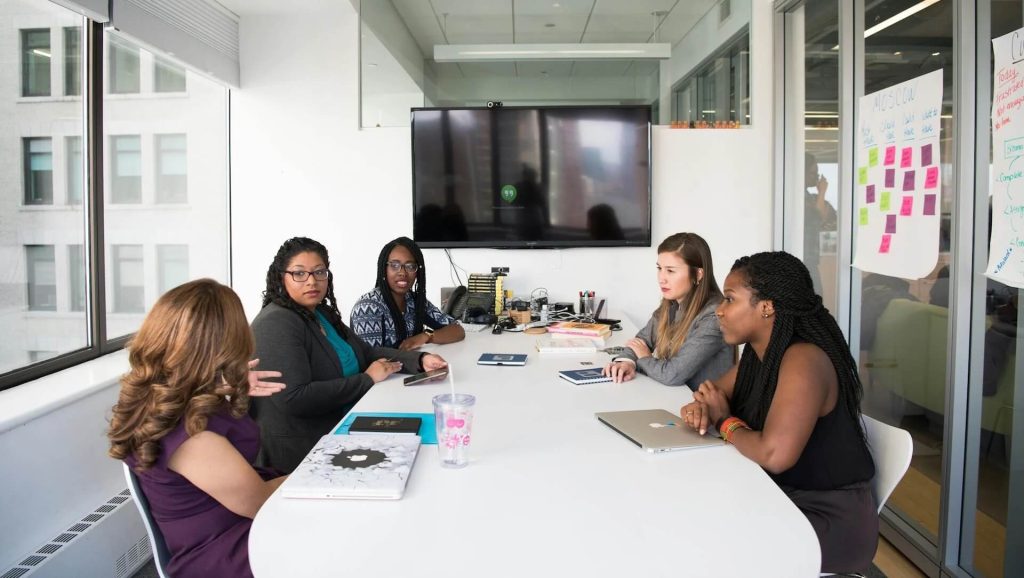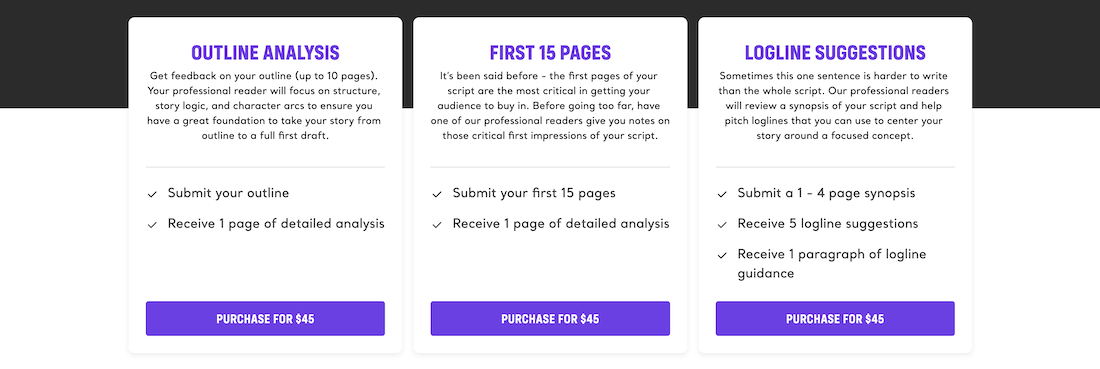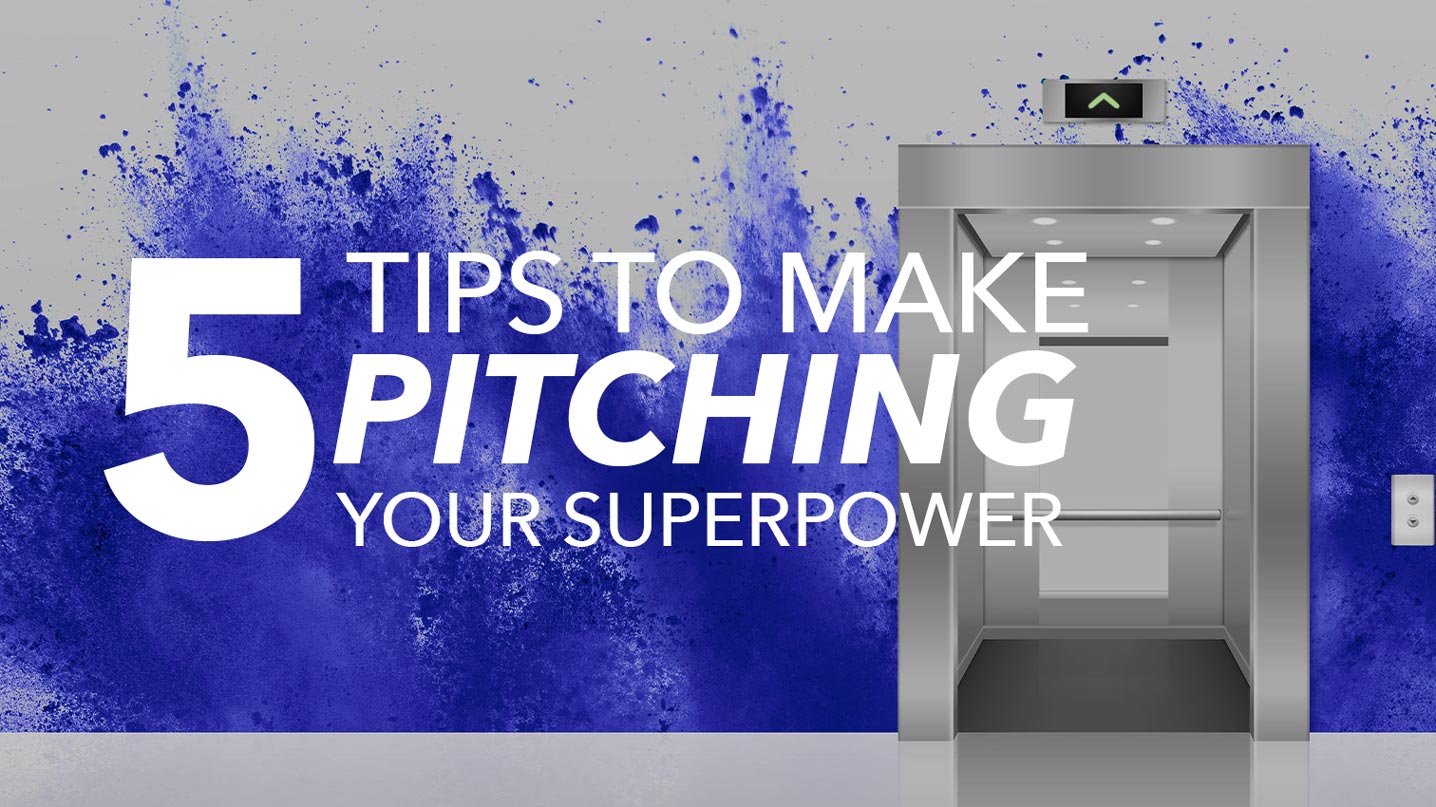What You Need to Bring to a Pitch Meeting

Most screenwriters have the misconception that all meetings with Hollywood insiders are the same. They are not. Some meetings are about getting to know the writers and seeing what other prospects they have. Other meetings are about seeing if a writer has a particular take on an open writing assignment. Regardless of the type of meeting you’re in, you’re going to need to be ready to pitch yourself, your take on a concept, and your projects.
With that in mind, here we will break down the Hollywood meeting dynamics, demystify them, and offer some simple tips on how to prepare for your meetings with industry insiders.
The Three Different Types of Hollywood Meetings
Before we get into what you do (and don’t) need to bring, let’s differentiate the types of meetings you can expect to encounter on your screenwriting journey.
1. General Meeting
General meetings are pretty straightforward. You either submitted a script that caught the eye of producers, executives, managers, or agents you're meeting with, or your representation has arranged for you to meet with potential suitors who may have screenwriting assignments for you.
The general meeting is really about getting to know you. The people who invited you to the meeting are there to determine three things:
- What type of personality do you have
- What type of writer you are
- Whether or not they consider you a good fit for their project or company
It’s not enough to have a great script. It’s not enough to be a great writer. You need to be a good fit for them. What exactly does a “good fit” mean?
- Can you handle the pressure?
- Can you take script notes well?
- Can you find creative solutions to logistic problems?
- Can you avoid problems within your work?
- Can you deliver on deadlines?
- Can you collaborate well with others?
- Can you handle the work on your own without your hand being held?
- Are you the right person for any job they have for you?
These meetings also may involve you needing to pitch other scripts you may have with the sole purpose of them being able to see if you are a one-trick-pony or someone with a great body of work. And maybe you have a surprise script they didn’t know about that falls more under the umbrella they’ve been searching for in a project.
2. Open Writing Assignment (OWA) Meeting
Open writing assignments are commonplace in Hollywood. When studios, networks, and streamers need to develop or rewrite a concept or intellectual property, they often inform management companies and agencies about potential assignments for worthy screenwriters.
Screenwriters will be given materials from these Hollywood insiders detailing the project they need to attach screenwriters to and will be given a short amount of time to come up with their take on that material.
Pitch meetings will be set up with multiple candidates. The powers that be will listen to the pitches and find the best screenwriter(s) for the project.
3. Pitch Meeting
The pitch meeting happens as a result of any number of circumstances:
- They like an unwritten concept you pitched to them and want to learn more.
- The script that got you into the room is now being considered by higher-level executives and decision-makers.
- You’ve been offered the assignment and now need to convey your full vision for the script before you are cleared to begin writing.
- You are meeting with a director or higher-up producer who wants to give final approval of your attachment to the project.
These are just a few potential circumstances that could get you in the room for a pitch meeting. Regardless of the circumstances, you’re there to pitch a specific project.
Read More: What I Learned from a Full Week of Hollywood Meetings
What To Bring to General Meetings, Owa Meetings, and Pitch Meetings
There are physical things you can bring to each of these meetings—but you’ll especially need to be mentally prepared as well.
What To Bring to General Meetings
They already have your script, so you don’t need to bring a hard copy—but it also doesn’t hurt to have one in your messenger or laptop bag (which you should have for any Hollywood meeting). Some industry insiders still prefer to have a hard copy of the script, sure, but they’ll have their own, so you’re not bringing a copy for them. Instead, you could use the hard copy as a creative reference if you need or want to refer to specific pages or sections. But generally, this is just a backup in case the need arises.
Other than that, the only physical thing you need to bring is you. Don’t worry too much about your attire. Just use common sense.
Business casual is usually the best way to go. If you’re a suit person, go for it. But know that most insiders you’ll be meeting with will likely be business casual. And if not, you don’t want to be competing with insiders who may have a higher budget for their wardrobe.
What you do need to bring is a great knowledge of the script that got you into the room. If they are interested in that script (sometimes it’s only a sample of your writing to them), be prepared to answer questions like:
- What are the themes you’re exploring in the story?
- Where did you come up with the idea?
- What is the character arc of your protagonist?
- Why should you be the one to tell this story?
You need to know the answers to these questions. And those answers need to come fast and easily to make a great impression.
Read More: The Ultimate List of Story Development Questions
You also need to come ready with comps. Comps are short for “comparisons” of well-established movies similar to your script:
- It’s Jurassic Park meets The Martian
- It’s The Texas Chainsaw Massacre meets Rosemary’s Baby
- It’s The Walking Dead meets A Quiet Place
Comps are an easily relatable comparison that offers a general aesthetic look at what type of script you’re trying to sell them.
And remember, when you’re in a general meeting, you need to be ready to pitch other scripts you have. Why? After the get-to-know-you part of the meeting, followed by a general quick discussion about the script that got you in the room, the first question they’ll likely ask is “What else do you have?” Be prepared to answer that question with ease.
So, mentally, you’ll need to bring a few more quick elevator pitches to the meeting. These will be from memory, not written pitches.
Read More: How Writers Can Master the Elevator Pitch
What To Bring to OWA Meetings
Open writing assignment meetings are pretty specific. They have brought you in to hear your take on the concept or intellectual property they need a writer for. You’ll generally have anywhere from twenty to thirty minutes at the most.
So, you’ll need to come ready to pitch. And pitch quickly. You shouldn’t need to use the full twenty or thirty minutes to pitch your whole take because you want to leave plenty of room for their follow-up questions—and your answers to those questions.
A five-to-ten-minute pitch is the best. While this isn’t a piece about pitching, we’ll offer this advice—be excited, be prepared, and be ready, willing, and able to answer all questions.
Read More: 10 Things You’re Doing Wrong When Pitching Your Script
What physical things should you bring? Well, you haven’t written the script yet, so you don’t need that. Since you’re not getting paid yet, be sure you’re not assuming you have the job by writing a detailed outline. You should be paid for that if you get the assignment. OWAs are highly competitive. You’ll be up against multiple writers. Just be ready to pitch your take.
If you need visual aids like concept art and storyboards, be sure you don’t have anything overly excessive. And they better be high quality and worthy of the time you take to use them. No pencil scratches or stick figures.
One of the best resources to have going into any pitch meeting is a solid pitch deck. Pitch decks are visual and literary presentations that break down your pitch.
Read More: How to Create the Ultimate Screenplay Pitch Deck
Pitch decks can be offered before the pitch meeting, which will shift the meeting into a discussion mode about what has already been shared. However, higher-level producers and development executives may not have had the time to read it. So come prepared.
In the end, they’ll be more impressed by you being able to convey your take through words, as opposed to possible crutches of art, storyboards, or props.
What To Bring to Pitch Meetings
The sky is the limit when you’re pitching to higher-level industry figures. Some successful screenwriters master their pitches by knowing their story backward, forward, and inside out. They’re ready, willing, and able to answer any questions. And they can do so swiftly.
Other successful screenwriters can succeed in using both words and creative tools like concept art, storyboards, and even props. Additional materials could come in the form of pitch decks and conceptual footage designed specifically for the pitch.
However, most of these types of visual pitches and presentations come from auteurs—directors who also write the scripts for their movies. Most of the stories you’ll hear or read about pitches that involve these types of physical assets are from auteurs pitching their take on how they would direct the movie in question.
If you're "just" a screenwriter, you don't need to go to those lengths—and no one will likely expect you to either.
The key thing in any pitch meeting is to know your story, your characters, the genre, the comps, and... everything you need to sell your story.

---
Here’s the number one thing you should bring to all of these Hollywood meetings: passion.
You need to bring a passion for your stories or theirs. Forget about ego. It’s poison. Leave your ego behind. Confidence is great. You can be confident in your abilities. But passion is the one true thing you need to bring to any pitch meeting. They’ll respond most to that.
Check out our Preparation Notes so you start your story off on the right track!

Ken Miyamoto has worked in the film industry for nearly two decades, most notably as a studio liaison for Sony Studios and then as a script reader and story analyst for Sony Pictures.
He has many studio meetings under his belt as a produced screenwriter, meeting with the likes of Sony, Dreamworks, Universal, Disney, Warner Brothers, as well as many production and management companies. He has had a previous development deal with Lionsgate, as well as multiple writing assignments, including the produced miniseries Blackout, starring Anne Heche, Sean Patrick Flanery, Billy Zane, James Brolin, Haylie Duff, Brian Bloom, Eric La Salle, and Bruce Boxleitner, the feature thriller Hunter’s Creed, and many Lifetime thrillers. Follow Ken on Twitter @KenMovies and Instagram @KenMovies76
Get Our Screenwriting Newsletter!
Get weekly writing inspiration delivered to your inbox - including industry news, popular articles, and more!































